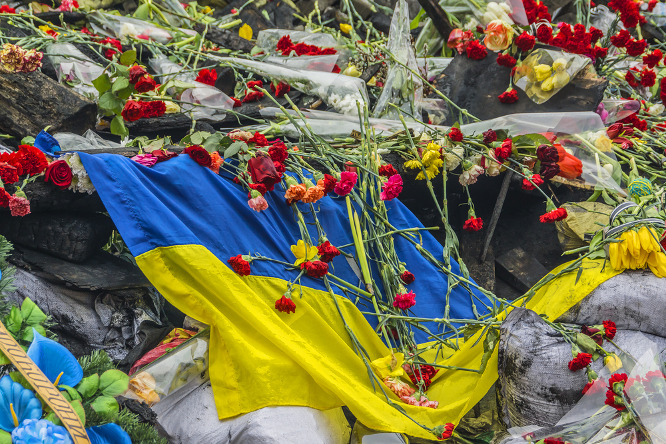Last Chance for European Values
The conflict in Ukraine is probably the last chance to stop the Russian imperialistic “appetite”. If the European Union does not take serious steps, it could be too late. Now is the time to answer the question: Is there still a belief in the power and necessity of European Values or only in economic interests?
March 22, 2014 -
Paweł Pieniążek
-
Articles and Commentary

Photo by Shutterstock
On November 21st 2013, former President Viktor Yanukovych said that Ukraine would not sign the Association Agreement with the European Union because the Ukrainian economy was not ready to compete with the more developed ones. This decision started a wave of indignation in the country. After the appeal of the Ukrainian journalist Mustafa Nayyem on Facebook, people marched on the Maidan Nezalezhnosti (Independent Square) – where nearly a decade earlier Ukrainians were fighting for fair elections at the time of the Orange Revolution.
November 21st began a process which was not expected. Most analysts were quite pessimistic at the time: “They will not achieve anything”, they had said. Thankfully, the people on the Maidan had more optimism. After three months, the protesters defeated the regime and Yanukovych fled from Ukraine. Opposition politicians created a new government and today we can suppose that the presidential elections which will be held on May 25th will be free and fair.
This was not an easy win. As a result of the protests, more than a hundred perished, hundreds more were injured. They were shot by militia special forces. It is the price for a chance of freedom. The Ukrainian protesters were the first ones who died under the European Union flag. But Ukrainians had felt that they were alone in their struggle.
During the three months of protests, western countries were not very interested in Ukraine. If we heard anything, it usually was scepticism. I think the reaction by the European community was something of a sad irony. The European Union itself is experiencing a crisis of identity. Its citizens do not trust their governments. They do not feel that they are a community. Ukraine provided a perfect response to this crisis – that this project could be attractive again. But the aspirations of the people on the Maidan were rejected. In Kyiv, people went out on the streets because of the European Union and showed what sacrifice means. This should be a feedback and inspiration for the European Union and those who question its value.
When the protests began, they were called the “Euromaidan”, after less than a month they lost the prefix “Euro”. The leaked phone call between US Assistant Secretary of State Victoria Nuland and US Ambassador to Ukraine Geoffrey Pyatt, where Nuland famously said “F**k the EU”, resonated in Ukraine. The goal of the leak was of course to discredit the US government’s role in Ukraine, but the Maidan agreed with this sentiment. The most annoying phrase in Ukraine at the time of the protests was “we are very concerned” – a phrase that was overused and abused by western officials.
The Russian Federation does not express concern – it implements a concrete plan. Its first task was to not allow Eastern European countries to sign any documents with the European Union. The subsequent step is to destabilise the countries and make European integration impossible in the future. We saw this type of politics in Georgia and Moldova. Right now we see this process in Crimea and in Northeast Ukraine. The reason why Vladimir Putin chose this policy is his dream of rebuilding a Russian empire under the banner of the Eurasian Union.
The Eastern Partnership illustrates how successful Putin’s plan is right now. After the summit in Vilnius held in November 2013, nobody really remembers the Eastern Partnership. Russia perfectly disposed of it. At the beginning of 2013, European Union officials expected that four Eastern Partnership countries would make the step forward. This really did not happen. In all of the countries, Pro-Russian and separatist moods were activated. They are inspired by Russia just like in Crimea.
Russian politicians lie about what is going on. We “heard” about Russian citizens killed in Ukraine, but nobody was killed. We heard about Crimean “self-defence soldiers” who bought their equipment at shop down the road, but “incidentally” they are using the same equipment like the Russian Army – and have trucks with Russian Army registration numbers on them. We heard about a “legal referendum”, which violates almost all democratic standards, etc.
The reason why European countries began integration was to stop war in Europe. Right now there is now a danger of a new conflict. If western countries do not react, they would lose trust in Central and Eastern Europe, because there are no guarantees of safety. After the war in Georgia in 2008, the common view was that Russia would not take any more steps. However, they did, and nothing really happened. So what kind of guarantee can any other country get today – including NATO members?
The European Union should show its support for Ukraine and do everything to prevent bloodshed near its borders. This will require a level of solidarity of which they have already forgotten. Today, the European Union is facing its last chance to pass the test of its own European Values and we will see how important they really are.
Paweł Pieniążek is a journalist specialising in Eastern Europe. He is a contributor with the Polish daily Dziennik Opinii, New Eastern Europe, the Polish magazine W Punkt, and the portal Zaxid.net.

































